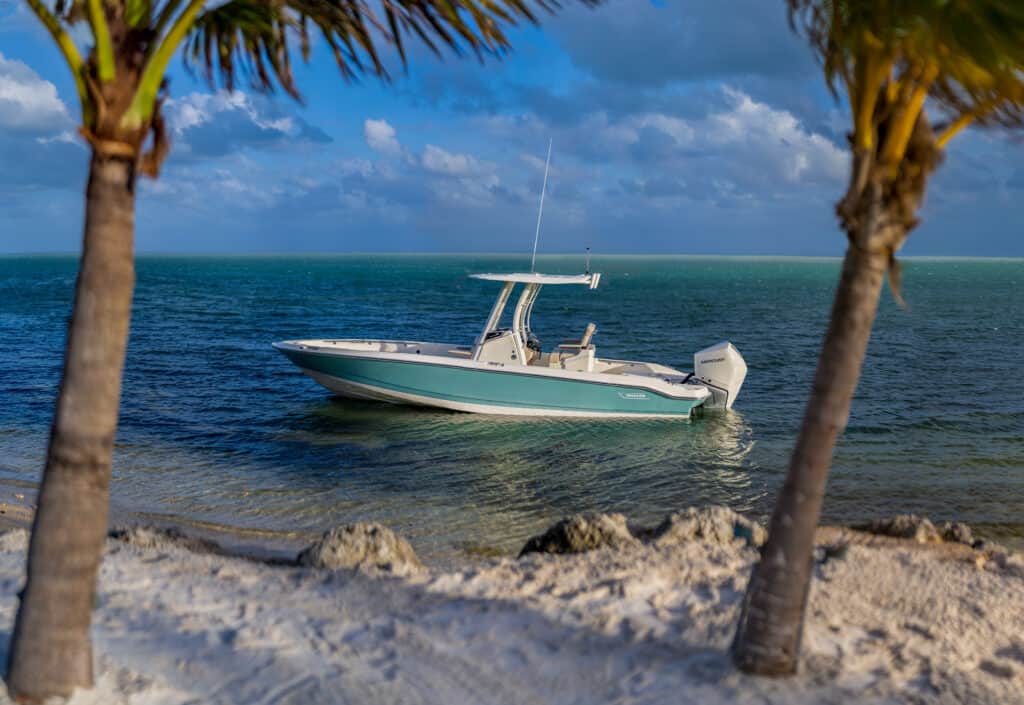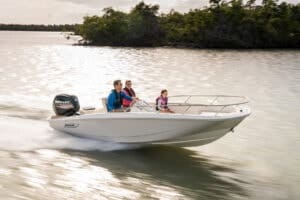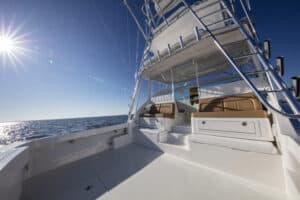You know you want to join the elite boat owner’s club, spend your free time on the water, and have a boat of your own to use whenever and wherever you want, but you don’t really know which boat to buy. You want to buy a boat that is a good investment, or as good of an investment as a boat can be, but you’re not sure where to even begin.
Well, first you need to create a boat budget and stick with it. You can use a free boat loan calculator to see how much boat you can afford and what your approximate monthly payment will be. Then check out a boat loan rate estimator tool. You can input things like your credit score range, the boat loan amount, the year of the boat, and if it’s a new or used vessel. This tool will then generate a personal boat loan interest rate just for you.
Now, you have an idea of your boat budget, how much your monthly payments will be, and what your interest rate will be; it’s time to go shopping…boat shopping that is. There are so many different types of boats to choose from. There are makes and models galore, as well as boats for all different lifestyles. You may want a jet boat to use in local waterways with your family, or a fishing vessel that you can use for extra income, or you may be looking for a yacht so you can island hop in the utmost luxury and comfort.
No matter what type of boat you decide to buy, you will want to take the following into consideration:
- The cost of the boat and its potential resale value
- The condition of the boat and how it has been stored if it’s a used vessel
- The age of the boat; if it’s new or used, and how many hours are on the engine
- The boat’s features, technology, and amenities
- The boat’s intended use, if it fits your lifestyle, and how often you plan on using the boat
- How the boat will depreciate over time
Boat Values
When choosing a boat, you want to find out how much the boat is worth and which boats hold their value. Just because a boat is being sold for $100,000 doesn’t mean it’s actually worth $100,000. A great comparison is the housing market. A tiny two bedroom, one bathroom home may have sold a year ago for $250,000 and now because of low supply in that area, the same property may sell for $500,000. But, let’s say demand drops, interest rates keep increasing, and there is a surplus of homes for sale, that same property may now only be worth $350,000. A house, just like a boat, is only worth what someone is willing to pay for it.
But unlike real estate, boats tend to depreciate over time. You want to ensure you’re not overpaying for your boat. To do this, research what other similar boats have sold for recently. Does the boat manufacturer have positive overall reviews? Are these particular boats in high demand or are they taking months to sell? Are these boats more expensive to maintain than other boats? How will you store this boat? Does the boat have limitations? For example, it can’t be used in saltwater or it can only be driven at slow speeds.
Compare features on the boat you want to buy with features on other boats available on the market. Is it worth it to you to pay extra for additional features such as an extended swim platform, the newest GPS, high-quality speakers, or a built-in fridge? You may get value out of these features because of how you use the boat and the convenience of them, so the extra costs may be worth it to you.
However, just because you chose a top of the line amenities package and paid a premium price for it, doesn’t mean it will hold its value when you go to resell the boat. Not everyone cares about the same features. In general, most boat owners take a loss when selling their boat. In fact, most of the ‘value’ in a boat comes from personal and emotional enjoyment of the boat versus the actual monetary value. But you still want to get the most bang for your buck so to speak.
That’s why it’s important to shop around and not buy the first boat you like. Check out new and used boats, different manufacturers, different types of boats and sizes, and boats in various conditions. And remember that there isn’t one particular boat that holds its value over time. Instead, it’s a combination of factors that influence which boats hold their value.
A Fixer Upper Boat
If you’re handy, have experience fixing boats, or know someone who does, a project boat may be the way to go. For example, you may be able to purchase an inexpensive sailing boat, get the engine fixed, paint the boat, restore the woodwork and bring it back to life, and save tens of thousands of dollars in the process.
Once the boat is finished, it may be worth more than boats in comparable condition and you bought the boat for a discount, did most of the work yourself, and now have a boat worth more than what you paid for it. This isn’t always the case, but is a good example of how a project boat may hold its value better than a new boat.
New vs. Used Boats
Let’s take a dive into new boats vs. used boats a bit more and see which boats hold their value better. When you purchase a new boat, you reap the benefits of being the first owner, no one has used the boat before, everything is brand new, and it may even be covered by a manufacturer’s warranty. You will get to try out the latest technology and the newest features that the manufacturer came up with. You may even get to customize parts of the boat, choose add-ons, and choose colors and materials.
Those are all great for your enjoyment, but how do they add up value wise? Typically, the first owner of a boat takes a hit with the initial depreciation. Once the boat is titled, it immediately loses some of its value, similar to a car leaving the dealership for the first time. Additionally, you will pay a higher price because the boat is new, than if you bought a boat that was just one year old.
When you buy a used boat, you obviously won’t be the first owner, and you most likely won’t get a warranty, but you will get a better deal overall. You may be able to buy last year’s model for a good price because dealers are trying to get rid of them to make room for the newest models to arrive. You may also have more wiggle room in negotiating. You can choose to buy from an individual seller or a boat dealer and unlike new boats whose prices are usually pretty set, you may find a desperate seller or a boat that you can grab for a great price and then upgrade it later.
Keep in mind that Trident Funding offers financing for both new and used boats. Whether you want to buy a small fishing boat or a luxurious cabin cruiser, we can help you get aboard the boat of your dreams. We’re an industry leader in marine financing with nearly 30 years of experience. They help you sail through the entire loan process, and you can get started right away by applying online.
Boat Depreciation
When asking which boats hold their value, depreciation plays a major role. Expect at least 10% to 15% depreciation over the first year, if the boat was purchased new. After that, a boat will typically depreciate about 20% to 30% by the fifth year and a total of 30% to 40% by the tenth year. This is called a boat depreciation curve and will vary slightly with different makes and models of vessels. Boats are considered to be a depreciating asset because they lose some of their value as soon as they are sold to their first owner.
Depreciation overall can’t be controlled, but you can limit how much your boat depreciates by doing a few important things:
- Keep the boat in good condition all the time. Clean it after every use, service it as recommended by the manufacturer, fix all repairs when they happen, and keep all service and maintenance records.
- Properly store your boat. If you live in a cold climate, your boat may need to be winterized or stored indoors during the harsh winter months. If you live in a place that is sunny year round, protect your boat from UV damage with a cover, keep it in a shaded area, or store it indoors when not in use.
- Keep supply and demand in mind. Yachts typically depreciate faster than more popular styles of boats such as jet boats and deck boats because there is less demand for them. A smaller number of people can afford to buy a yacht than a less expensive vessel.
- Consider that used boats, when properly maintained and taken care of, depreciate less than new boats. Weigh the pros and cons of buying a new vs a used boat.
- An off-brand or a boat manufacturer that has gone out of business or has overall negative reviews can affect the value of your boat. It may be hard to re-sell and potential buyers may be wary about purchasing it, being able to get parts if something breaks, and they may want a discount on the price.
The Wrap Up: Which Boats Hold Their Value
Which boats hold their value is a popular question for boat buyers. The answer is it really depends. Boats in good condition, that are used, but not too old, have updated technology but not necessarily all the bells and whistles tend to hold their value best. Brand new boats tend to depreciate quickly over the first year and you may enjoy all of the features and amenities offered but they generally don’t hold their value. Things like the current supply and demand of the boat market, the boat’s condition, its number of hours, and how it can be used all affect its value.
Frequently Asked Questions: Which Boats Hold Their Value
How Many Hours is Good for a Used Boat?
The number of hours on a boat refers to the number of hours that the engine has been ‘driven’ or used. Typically, diesel engines last longer than gas engines, and will have more hours on them before they need to be replaced. There is no ‘set’ number of hours that are good, but typically gas engines last up to 1,500 hours. So, if you buy a boat with a gas engine with less than 750 hours on it, the engine is about halfway through its life. How long it takes to get those hours will depend on how often you use the boat. Unless you’re a boat mechanic or want a project, you probably don’t want to buy a gas engine boat with more than 1,000 hours on it because they may need some work done to them and then to eventually be replaced.
A diesel engine will typically last for about 5,000 hours so much longer than a gas powered engine. But, just like with all boat parts, the engine needs to be properly maintained for it to stay in good working order. And don’t decide on buying a boat just based on the hours, also check out its overall condition, its year, features, and technology onboard so you can make an informed decision.
What Are Some Tips on Finding Boats That Hold Their Value?
When wondering which boats hold their value consider the following:
- Hours on the engine and the boat’s overall condition
- You may be able to negotiate more with a private seller than a boat dealer or a manufacturer
- Compare prices on makes and models. Do your research and find out if it’s cheaper to buy a boat with less features and upgrade them yourself later down the road.
- Consider a one to two year old boat. You get the added benefit of an almost new boat with updated technology and newer features but you won’t take the depreciation hit that the first owner took. These boats tend to hold their value best and you may break even if you sell within a few years.





